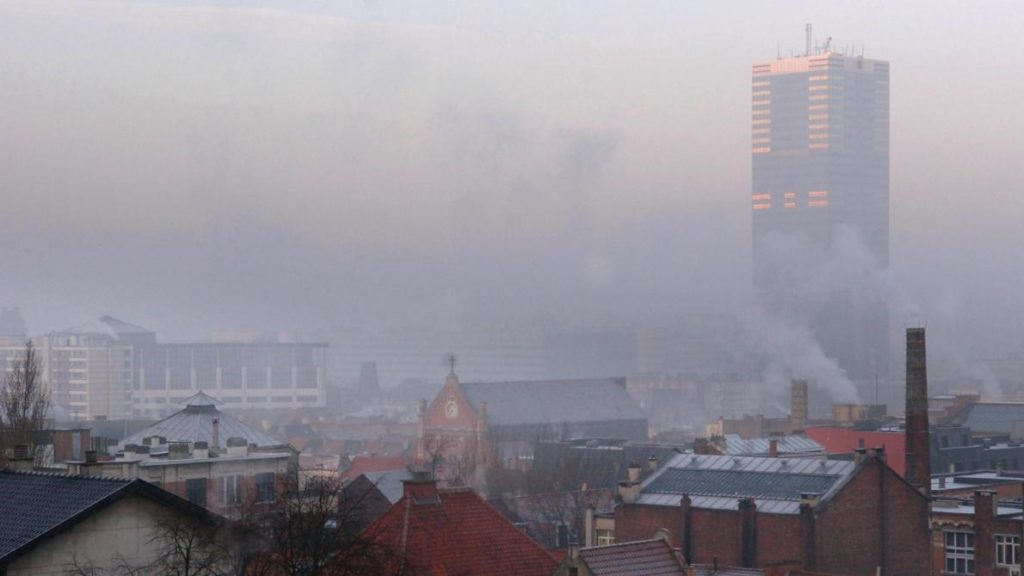Two activist associations campaigning for cleaner air are urging the Brussels government to take tougher actions to reduce the gap between the region's air pollution levels and the new, lowered guidelines.
On Wednesday, the World Health Organisation (WHO) lowered almost all the reference thresholds for key air pollutants introduced in 2005 that are harmful to health. This follows scientific evidence showing how even reduced concentrations of air pollution affect different aspects of health more than previously understood.
With this latest announcement, the gap between the WHO legal limits and the actual pollution levels in Brussels is widening, according to a statement from the associations Les Chercheurs d'Air and ClientEarth, that campaign for cleaner and healthier air in the region.
"These new guidelines show that the conclusion is irrefutable: air pollution, even at lower levels than previously thought, is seriously endangering people's health and action must be taken," Ugo Taddei, a lawyer at ClientEarth, said.
"This should serve as a wake-up call to the government in Brussels - it must live up to its commitment to bring air quality standards in line with WHO guidelines. It will no longer be able to feign ignorance, in court, to people whose health has suffered from the impacts of air pollution," Taddei added.
Millions of premature deaths
Every year, exposure to air pollution is estimated to cause seven million premature deaths globally, as well as resulting in millions of people losing healthy years of life, putting it on a par with other major global health risks such as an unhealthy diet and smoking, according to the WHO.
On Wednesday, a report by the Superior Health Council (HGR) has shown that air that is more heavily polluted increases the risk of getting a coronavirus infection and developing a more severe form of the illness.
The findings stated that even a small increase of 1 microgram in the concentration of fine dust in the air is associated with longer ventilation time in hospitalised Covid-19 patients and possibly even with an increase in mortality of 8-11%.
In Belgium, air pollution is responsible for more than 9,000 premature deaths per year, whilst in Brussels, it is estimated that more than 500 people die prematurely each year because of nitrogen dioxide (NO2), often linked to diesel engines and thermal power stations.
Related News
- EU and US pledge to reduce methane emissions in energy and agriculture
- Drop in share of Belgian company cars with diesel engine
Despite the government committing to lowering pollution levels in the region, the levels of fine particular matter (PM₂.₅) in Brussels are five times higher than the new WHO recommendations, whilst the legal limits of NO2 are now four times the recommended limits.
"The Brussels government urgently needs to speed up the implementation of ambitious measures, such as the roll-out of new school streets and the reinforcement of the low emission zone to improve the air quality in the Brussels region," Eva Zemmour, from the non-profit organisation Les Chercheurs d'Air said.
Brussels Minister for the Environment, Alain Maron, told Belga News Agency that he was aware of the urgent need to act to reduce pollution and that these new standards require transformational policies, which the government is putting in place, including the Low Emission Zone and the Good Move plan.
The government's next step to improve air quality will come in January 2022, when Euro 4 diesel vehicles (introduced between 2006 and 2010) will no longer be allowed to drive in the Brussels-Capital Region.
"We know the magnitude of the problem and we know how to solve it. These updated guidelines give policy-makers solid evidence and the necessary tool to tackle this long-term health burden," said WHO Regional Director for Europe, Dr Hans Henri P. Kluge.
The European Commission has since said that the WHO guidelines will serve as a basis for the revision of the EU’s Ambient Air Quality Directives and launched a public consultation on the revision of EU rules on air quality.

